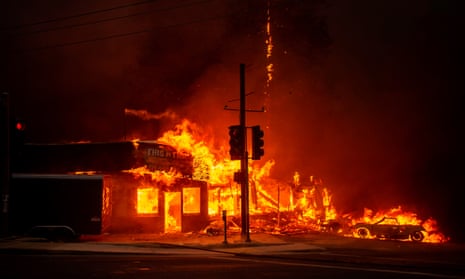Imagine that US leaders were told that hundreds of nuclear weapons were set on a timer to detonate across the planet, progressively and in increasing numbers, over the coming years and decades. The lives of millions would be upended, if not made nearly impossible to survive, by transformed weather patterns and resource scarcity. Tens of millions would become migrants as regions became uninhabitable. Millions would die, more and more as time went on. If this science fiction were reality, US leaders would lead an international effort to immediately disarm and dismantle the weapons.
But this isn’t science fiction. Climate change is a ticking time bomb, literally threatening to end human life on earth over the coming centuries. As climate journalist Peter Brannen describes it, Earth faced a similar crisis hundreds of millions of years ago during the “Great Dying” when volcanoes spewed so much carbon dioxide into the air – including magma that blanketed an area as large as the lower 48 US states, 1km deep – that it almost killed all life. Today, Brannen says, “we’re shooting carbon dioxide up into the atmosphere 10 times faster than the ancient volcanoes”.
Even in the shorter term, climate change will make the world far more dangerous. A World Bank Group report estimates that climate change could drive 140 million people to move within their countries’ borders by 2050. A report by the Trump administration finds climate change could reduce the size of the US economy by 10% – more than twice as bad as the worst part of the Great Recession – by 2100. Growing resource scarcity could cause more wars. Deadly and destructive extreme weather events such as Hurricanes Harvey and Maria and California’s Camp fire are mild symptoms of the plague to come.
There is no greater national security threat than climate change. Even the specter of nuclear war between great powers – the only thing that could remotely mimic the effects of climate change over time – is a much lower risk than climate change, which is already happening.
Every year we fail to act the problem grows, and the solution becomes more difficult. As America dithers, climate change is sparking a slow-motion nuclear-scale holocaust. If the world fails to urgently mitigate climate change, no other challenge – not the rise of China, Russian aggression, terrorism, nor some other future geopolitical peril – will matter because humans won’t survive to be the cause of these threats or suffer from them.
America’s failure is not for lack of capacity to safeguard against future threats – the US invests hundreds of billions of dollars every year in defense to deter adversaries such as Russia and China, and tens of billions more in intelligence capabilities to monitor threats. Instead, America is paralyzed by a lack of political will. Donald Trump and his allies in Congress – many of whom deny the existence of climate change – are making the problem worse. The president announced his intent to withdraw the US from the Paris climate agreement and is rolling back regulations that would have cut emissions.
Despite this dark reality, there is reason for hope. In 2015, the world came together to negotiate the Paris agreement, which set the goal of limiting global temperature increases to well below 2C. Despite a hostile Trump administration, many US governors, mayors, businesses and private citizens are already leading the way. So are other countries as they seize the economic and public health opportunity that comes with a clean energy future.
The path ahead, to say the least, is daunting. Even if the US were not to leave the Paris climate agreement, the action required to realize its potential is enormous. US policymakers will need to use every policy tool in their toolbox to drive unprecedented deployment of clean energy and build out zero-carbon transportation infrastructure. When the US leads by example, domestic emissions will fall, and new diplomatic doors to more ambitious climate action will open.
Climate activist Bill McKibben says that “global warming … is a world war aimed at us all” and recommends that, like the national effort forged during the second world war to defeat the Axis powers, the US must “mobilize” American industry and citizens to transform to a clean energy economy.
Everybody will need to pitch in. For example, when the Obama administration was negotiating the bilateral climate deal with China in 2014 that made the Paris agreement possible, my colleagues and I in the east Asia bureau at the state department worked with the US climate negotiators on a statement with the 10 nations of Asean committing to cut emissions – a statement only made possible by the US-China deal. The painstaking negotiations for this relatively symbolic statement were indicative of how much work the US needs to put into the climate effort in every corner of the world – and the ripple effects it can have elsewhere.
It’s time for the US to treat climate change as the national security challenge it is. Diplomats are ready to negotiate new agreements. Development experts can support sustainable solutions for countries facing resource scarcity and in need of resilient infrastructure and community designs that can withstand more intense and damaging extreme weather events. The military can help respond to extreme weather disasters. National security experts around the world already recognize climate change as a serious threat to global stability and are ready to answer a global call to action.
Without success in tackling climate change, eventually none of the other threats we face will matter.
Michael H Fuchs is a senior fellow at the Center for American Progress, a former deputy assistant secretary of state for east Asian and Pacific affairs and a Guardian US contributing opinion writer
